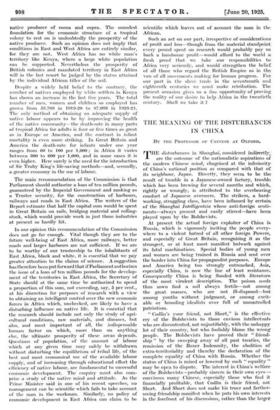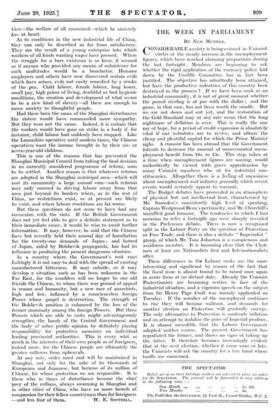THE MEANING OF THE DISTURBANCES IN CHINA
BY THE PROFESSOR OF CHINESE AT OXFORD.
THE disturbances in Shanghai, considered indirectly, are the outcome of the nationalistic aspirations of the modern Chinese mind, chagrined at the inferiority of China's national position as compared with that of, its neighbour, Japan. Directly, they seem to be the result of trouble in a Japanese-owned factory, trouble which has been brewing for several months and which,, rightly or wrongly, is attributed to the overbearing conduct of Japanese overseers. The strikers, a hard-, working, struggling class, have been inflamed by certain of the Shanghai Intelligentsia whose anti-foreign senti-1 ments—always present and easily stirred—have been played upon by the Bolshevists.
At present the actual foreign exploiter of China is Russia, which is vigorously inciting the people every-. where to a violent hatred of all other foreign Powers,, and especially of Great Britain, recognizing it as the strongest, or at least most manifest bulwark against its fatal machinations. Special bodies of young men and women are being trained in Russia and sent over the border into China for propagandist purposes. Europe and America being too strongly entrenched, Asia, especially China, is now the line of least resistance, Consequently China is being flooded with literature of the most virulent description. The poison seeds thus sown find a soil always fertile—not among the great masses, who are not ill-disposed—but among youths without judgment, or among excit- able or brooding idealists over full of uncontrolled patriotism.
" Codlin's your friend, not Short," is the effective: cry of the Bolshevists to those envious intellectuals who are discontented, not unjustifiably, with the unhappy lot of their country, but who foolishly blame the wrong people. The Bolshevists have proved their " friend- ship " by the sweeping away of all past treaties, the remission of the Boxer Indemnity, the abolition of extra-territoriality and thereby the declaration of the complete equality of China with Russia. Whether the status of China is raised or lowered by such " equality may be open to dispute. The interest in China's welfare of the Bolshevists—probably sincere in their own eyes= convinces many Chinese, especially those who find it financially profitable, that Codlin is their friend, not Short. And Short does not make his truer and farther- seeing friendship manifest when he puts his own interests in the forefront of his discussions, rather than the larger view—the welfare of all concerned—which he sincerely has at heart.
As to conditions in the new industrial life of China, they can only be described as far from satisfactory. :They are the result of a young enterprise into which ;workers of all kinds wanting wages have pressed. Where the struggle for a bare existence is so keen, it seemed as if anyone who provided any means of subsistence for ',such multitudes would be a benefactor. Humane .employers and others have now discovered certain evils which have arisen, evils not easily remedied by a stroke of the pen. Child labour, female labour, long hours, small pay, high prices of living, doubtful or bad hygienic conditions, the creation and development of what seems to be a new kind of slavery—all these are enough to cause anxiety to thoughtful people.
Had these been the cause of the Shanghai disturbances (the rioters would have commanded more sympathy. But they were not the cause. Indeed, it is certain that the workers would have gone on strike in a body if, for linstance, child labour had suddenly been stopped. Like the Lancashire operative until modern times, the Chinese operatives want the income brought in by their six- or 'seven-year-old children.
This is one of the reasons that has prevented the Shanghai Municipal Council from taking the final decision in an earnestly considered programme of reform, soon to be settled. Another reason is that whatever reforms are adopted in the Shanghai municipal area—which will cost its community a large annual sum—such reforms may only succeed in driving labour away from that area just beyond its borders where, as in the rest of China, no restrictions exist, or at present are likely to exist, and where labour conditions are far worse.
But these questions do not seem to have had any connexion with the riots. If the British Government does not yet feel able to give a definite statement as to their immediate cause, it would be wise to await further information. It may, however, be said that the Chinese have but recently held their annual day of humiliation for the twenty-one demands of Japan ; and hatred of Japan, aided by Bolshevik propaganda, has had its influence in producing the present dangerous situation.
In a country where the Government's writ runs (haltingly it is not easy to deal with the spread of existing manufactured bitterness. It may subside, or it may develop a situation such as has been unknown in the Far East, for the troublers will no longer be our old friends the Chinese, to whom there was ground of appeal in reason and humanity, but a new race of anarchists, high and low, inflamed by a conscienceless foreign Power whose gospel is destruction. The strength of the Bolshevik position is enhanced by the loss of the former unanimity among the foreign Powers. But those powers which are able to unite might advantageously 'strengthen the hands of the Central Government and the body of sober public opinion by definitely placing responsibility for protective measures on individual leading provincial authorities. This is every .whit as rnuch in the interests of their own people as of foreigners, indeed more, for the Chinese people are ultimately the krreater sufferers from upheavals.
At any rate, order must and will be maintained in Shanghai, not only for the sake of its thousands of Europeans and Japanese, but because of its million of (Chinese, for whose protection we are responsible. It is these who in times of disturbance become the chief (prey of the ruffians, always swarming in Shanghai and in other cities of China, who have .no more bowels of compassion for their fellow-countrymen than for foreigners











































 Previous page
Previous page